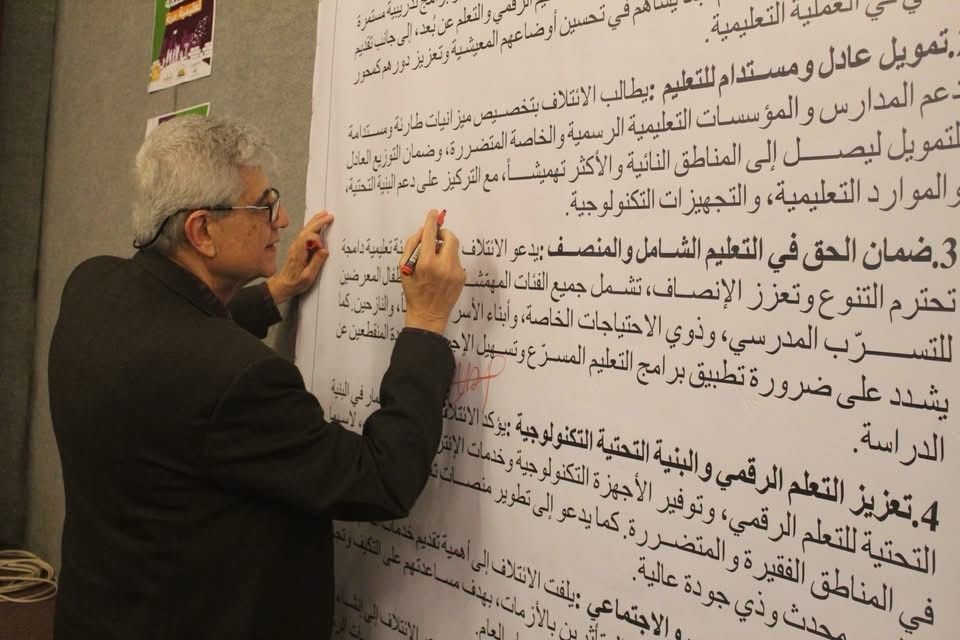We Communicate For Happy Children
 The Lebanese Coalition for Education: Children’s Right to Education and Play Amid Crises
The Lebanese Coalition for Education: Children’s Right to Education and Play Amid Crises 
May 16, 2025
The education sector in Lebanon is beset by mounting challenges: from the erosion of wages due to economic collapse and the absence of equitable corrective policies that guarantee the rights of wage earners, to the shrinking of expenditures on salaries and operations—particularly in the public sector. These crises are compounded by the repeated strikes of public school staff demanding the fulfillment of their rights, the ongoing rise in tuition fees in private schools, and the inflated cost of educational services in the absence of official oversight. All of this has led to a steady decline in the quality of education and a reduction in the number of effective teaching days in Lebanese schools, with public schools accumulating a 49% shortfall in teaching days between 2019 and 2025.
Emergencies only exacerbate these pre-existing crises, leaving a catastrophic intergenerational impact on children’s right to education in Lebanon. The latest of these calamities is the ongoing, albeit “contained,” Israeli war on Lebanon. This war has resulted in more than 60% of schools in South Lebanon being either damaged or converted into shelters. To this day, thousands of students in southern border villages remain deprived of equal access to education like their peers across Lebanon—due both to repeated Israeli violations and the absence of effective official plans.
In this context, and based on ANECD’s strategic focus on children’s status during crises and the rights of the early childhood workforce, the organization participated in an event organized by the Lebanese Coalition for Education at the Municipality of Saida in South Lebanon on May 3, 2025. The event took place as part of the Global Action Week for Education 2025 and combined awareness-raising on the goals of the Global Campaign for Education (GCE) with advocacy positioning education as a fundamental right.
The event was attended by representatives of associations, unions, humanitarian and educational institutions, teachers, and stakeholders in the educational sector, including school administrators and educational center staff. Students from one of the participating schools presented the key demands of the Lebanese Coalition for Education, namely:
Between Lebanon and the Arab Countries: Grave Challenges for Education and Early Childhood Development
In this framework, Dr. Ghassan Issa, ANECD’s General Coordinator and one of the co-founders of the coalition, delivered a presentation that included an overview of ANECD’s inception, intervention strategies, and working approaches. He reviewed ANECD’s role in promoting young children’s rights through multisectoral initiatives across several Arab countries. He also addressed ANECD’s vision of enabling young children in Arab societies to fully enjoy their rights within an environment rich in freedom, social justice, and equality, and its mission to connect efforts among institutions concerned with early childhood development, produce knowledge, and influence public policy based on scientific evidence.
Issa also elaborated on ANECD’s role in connecting countries and exchanging best practices in early childhood development, noting that the organization is currently working with partners in ten Arab countries. While ANECD has succeeded in establishing effective regional cooperation in early childhood development across the Arab region, significant challenges continue to hinder coordination and collaboration at the regional level. Issa summarized these challenges as the need to sustain engagement with national and regional networks during wars and crises, to maintain their ongoing operations, and to address the limited enthusiasm for collaborative regional efforts alongside many donors’ preference to separate their interventions targeting children and their families.
Issa further highlighted the “Tashkent Declaration 2022” issued by UNESCO and the commitments made in Tashkent toward achieving the desired transformation in early childhood care and education across Arab countries. He emphasized that the Declaration serves as a roadmap for rebuilding the education sector and affirms that early childhood care and education are not luxuries during crises, but rather foundational for recovery and peacebuilding.
This declaration aims to reaffirm the right of all children—girls and boys—to access quality care and education during early childhood, in line with Sustainable Development Goal 4.2 and the goal of ensuring inclusive, high-quality early childhood education.
In this context, Issa listed the major global challenges facing early childhood and education—including the COVID-19 pandemic, climate change, conflicts, humanitarian crises, socioeconomic disparities, and funding shortages. He also highlighted proposed solutions and the necessary commitments expected from governments and the international community, including increased investment in pre-primary education, capacity building, digitization, and the protection of children’s right to play and learn under all circumstances.
Regarding the situation of children in South Lebanon, Issa stressed that “Southern Lebanon’s children are growing up amid rubble and fear”. He pointed out that “Southern Lebanese Educators, parents, children, and young adolescents gathered not just to remember who and what was lost but to fight for what must be protected: their Right to play, learn, and thrive, their right to education, and their right to hope”. He emphasized that “play-based learning and emotional support are life-saving tools”.
